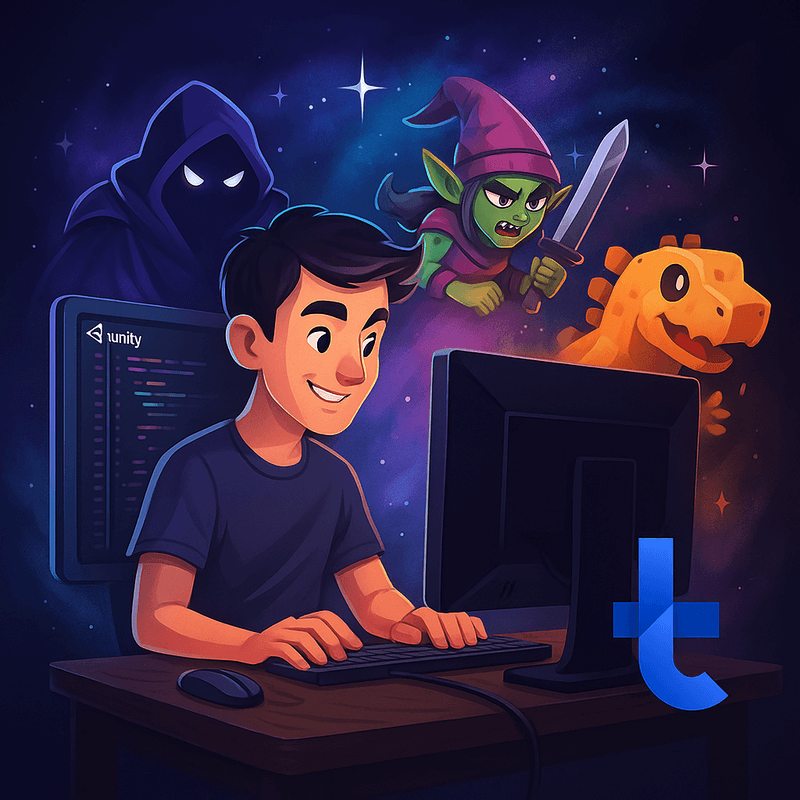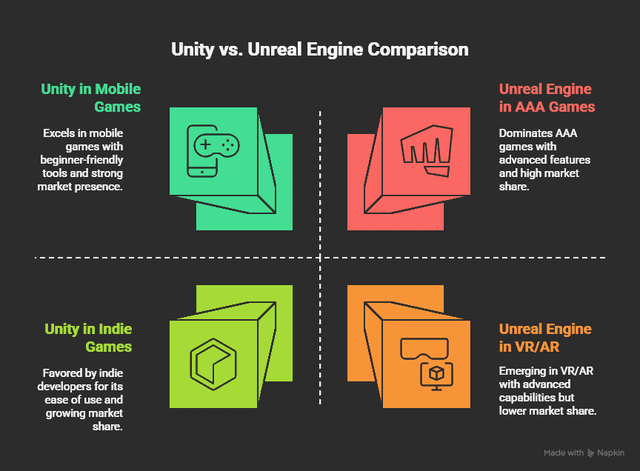Are Game Developers in Demand in 2025? A Complete Guide for Aspiring Developers

Introduction
Picture this: you’re scrolling through job boards, and you notice game developer listings popping up everywhere. At the same time, you hear about layoffs at major studios. So which is it—are game developers actually in demand in 2025?
If you’re someone like me, who has already tinkered with Unity to build a visual novel and later an alien mystery RPG, you probably wonder whether those hours spent debugging, animating, and testing are paving the way toward a real career.
In this guide, I’ll break down how the job market for game developers looks right now, what skills are sought after, and whether starting a career in game development is worth your time.
Read More: Top Gaming PC Trends for 2025: Innovations and Must-Have Builds
Demand for Game Developers in 2025
The global gaming market is projected to generate over $522 billion by 2025. This scale alone shows why studios need a steady pipeline of skilled developers.
Key drivers of demand include:
- Mobile gaming growth – Smartphones dominate the market, making Unity and Unreal skills more valuable.
- VR/AR development – Studios are hiring for immersive projects in education, healthcare, and entertainment.
- Esports and multiplayer experiences – Games with strong community features require teams focused on networking, balance, and live operations.
- AI in games – From NPC behavior to procedural generation, AI knowledge is now a top skill requirement.
What is the pay for a game developer?
Average pay for developers in the U.S. sits around $110,900 annually, with competitive entry-level salaries for those who can demonstrate portfolio-ready skills.
How the Industry Changed Pre- and Post-COVID
Before the pandemic, the gaming industry already had steady momentum. But COVID-19 lockdowns boosted revenues dramatically. Multiplayer games such as Animal Crossing: New Horizons thrived during this period.
- Pre-COVID: Growth, but primarily tied to physical game sales and early adoption of live services.
- During COVID: Explosive digital adoption and increased playtime.
- Post-COVID (2023–2025): The industry saw over 14,600 layoffs as companies downsized after pandemic overhiring. Studios now focus on efficiency and live service games, while still investing in new IP cautiously.
This creates an interesting paradox: strong global growth in demand for games, but also tighter hiring practices.
Covid changed the world. A lot of people turned to gaming, and as a result, gaming turned into passion. Make sure to recognize the sings of when gaming passion turns into obsession.
Impact of Recessionary Pressures
Economic slowdowns influence how game studios operate. Companies are:
- Protecting revenue streams through microtransactions and live-service models.
- Cutting staff in non-core departments to stay lean.
- Prioritizing projects with guaranteed returns over riskier experimental titles.
For aspiring developers, this means studios are hiring, but they’re more selective. A strong portfolio can help you stand out even when competition is fierce.
Is Becoming a Game Developer a Good Career Move?
Yes—but it’s not a golden ticket. The field is competitive and requires persistence. To succeed, you’ll need a mix of technical and creative skills:
- Programming knowledge – C#, C++, Python, or scripting within Unity/Unreal.
- Art and design basics – Even if you’re not an artist, understanding shaders, animation, or UI helps.
- Storytelling – Narrative design is crucial for many genres.
- Soft skills – Communication and teamwork matter, especially for larger studios.
When I worked on my Unity visual novel, I quickly realized that writing the dialogue wasn’t enough—I had to understand scene transitions, UI placement, and save/load systems. Later, when building my alien RPG, the technical challenge grew even bigger: I spent weeks fine-tuning AI behavior to keep the game engaging.
That hands-on experience reinforced a truth: employers look for proof you can ship projects, not just enthusiasm.
Barriers to Entering the Industry
Breaking into game development is not without challenges:
| Barrier | Explanation | How to Overcome |
|---|---|---|
| High competition | Thousands of applicants for junior roles. | Build a standout portfolio with small but polished projects. |
| Skill diversity | Studios value developers who understand programming, art, and design. | Learn the basics of multiple areas before specializing. |
| Misconceptions | Game design isn’t just “cool ideas,” it’s system balancing and iteration. | Study real design processes and contribute to mods or small projects. |
| Rare entry-level jobs | Junior positions are fewer compared to mid-level. | Start in QA, indie dev, or freelance projects to gain experience. |
The takeaway: persistence and skill-building are more valuable than waiting for the “perfect” opening.
Unity vs Unreal: The Two Biggest Engines
In 2025, Unity and Unreal Engine dominate the job market.
| Feature | Unity | Unreal Engine |
|---|---|---|
| Strengths | Great for 2D and mobile, VR/AR support, flexible across platforms. | AAA-quality visuals, strong for high-end PC/console titles. |
| Learning curve | Beginner-friendly, large community. | Steeper, but highly rewarding for graphical fidelity. |
| Portfolio potential | Small indie projects, mobile prototypes, cross-platform demos. | High-quality demos for cinematic experiences or big studios. |
I personally leaned into Unity because of its accessibility when I was starting. My first visual novel project would have been overkill in Unreal. But when I tackled my alien RPG, I started bumping against Unity’s performance limits for complex 3D environments—something Unreal might have handled better.
Knowing both engines is a major plus, as many job listings ask for experience in either.
Skills in Demand for 2025 and Beyond
Game studios are hiring for:
- AI/ML expertise – smarter NPCs, procedural systems.
- Artists – having an amazing looking game just adds to the story. Now, you can be the artist as well, but if not you can look into unityunreal.com for game assets. I use it all the time.
- VR/AR design – immersive storytelling experiences.
- Multiplayer backend knowledge – servers, matchmaking, anti-cheat.
- Live service management – updates, monetization systems, community balance.
- Cross-platform optimization – building for PC, mobile, and console simultaneously.
Many of these areas are accessible to indie developers, too. Even my small alien RPG project required server-side logic for saving and syncing, which taught me skills directly relevant to multiplayer development.
Unity vs Unreal Engine: Market Share, Barriers to Entry, and Pricing
When people ask are game developers in demand, the answer often depends on which engine they specialize in. Two names dominate the conversation: Unity and Unreal Engine. Both are powerful tools, but they differ in terms of adoption, ease of entry, and pricing models. Understanding these differences can help aspiring developers choose the best path.
Market Share
Unity holds a strong presence in mobile and indie development. It powers more than 50% of mobile games on the market, and its versatility makes it popular across small to mid-sized studios. Unity is often the go-to engine for VR/AR projects thanks to broad platform support and faster prototyping.
Unreal Engine dominates AAA game production. Titles like Fortnite and Final Fantasy VII Remake showcase Unreal’s high-end rendering capabilities. While its market share in mobile is smaller, Unreal is the first choice for cinematic-quality projects and is increasingly used outside gaming in industries like film and architecture.
Barriers to Entry
Unity is widely considered beginner-friendly. Its C# scripting, drag-and-drop interface, and extensive tutorials make it accessible for newcomers. Developers building small 2D games or prototypes often start with Unity because the learning curve is less intimidating.
Unreal Engine requires more technical depth. It uses C++ alongside its Blueprint visual scripting system. While Blueprints make quick prototyping easier, mastering Unreal for professional use demands solid programming skills. This higher barrier means Unreal developers are in strong demand, but newcomers may face a longer learning curve before landing work.
Pricing
Unity follows a subscription-based model. It offers a free tier (Unity Personal) for individuals and small studios earning under $100,000 annually. For professionals, Unity Pro starts at around $2,000 per year. The predictable pricing makes Unity attractive to indie teams and freelancers.
Unreal Engine uses a royalty model. The engine itself is free to use, but developers owe 5% royalties on gross revenue after the first $1 million per title. For small projects, this is cost-effective. For blockbuster titles, royalties can add up quickly. Large studios sometimes negotiate custom licensing agreements.
Is Game Development Hard?
In all honesty, it is not. I believe anyone can start making games, as long as they are using engine such as Unity. All you need to know is a bit of C# language and learn the Unity work environment.
Essential C# Concepts for Unity
Basic Programming Skills
- Data Types: Understand variables, arrays, and collections.
- Control Structures: Use if statements, loops (for, while), and switch cases.
- Functions: Create and call methods, including parameters and return types.
Object-Oriented Programming (OOP)
- Classes and Objects: Learn to define classes and create objects.
- Inheritance: Use base and derived classes to promote code reuse.
- Polymorphism: Implement method overriding and interfaces for flexible code.
- Encapsulation: Protect data by using access modifiers (public, private).
Unity-Specific Concepts
- Unity API: Familiarize yourself with Unity’s scripting API for game development.
- MonoBehaviour: Understand how to use this base class for scripts in Unity.
- Game Objects and Components: Learn how to manipulate game objects and their components through scripts.
Advanced Programming Techniques
- Debugging: Use debugging tools to identify and fix errors in your code.
- Version Control: Implement version control systems to manage project changes.
- Code Optimization: Write efficient code and understand performance considerations.
User Interface Programming
- UI Elements: Create and manage user interfaces using Unity’s UI system.
- Event Handling: Implement event-driven programming for user interactions.
These concepts will provide a solid foundation for developing games and applications in Unity using C#.
Comparison Table
| Factor | Unity | Unreal Engine |
|---|---|---|
| Market Share | Strong in mobile, indie, and VR/AR | Dominates AAA, cinematic, high-end PC/console |
| Barrier to Entry | Beginner-friendly, uses C# | Steeper learning curve, C++ + Blueprints |
| Pricing | Free tier + Pro subscription (~$2,000/yr) | Free, 5% royalty after $1M revenue |

Summary: Unity vs Unreal Engine
Both Unity and Unreal Engine play a major role in shaping the game industry. Unity’s strength lies in accessibility and mobile dominance, while Unreal is favored for visually stunning AAA projects.
For those wondering are game developers in demand, the choice of engine matters. Developers skilled in Unity find opportunities in mobile, VR, and indie spaces, while Unreal specialists are sought after in AAA and cinematic projects. The best approach? Learn one engine deeply and gain familiarity with the other. This combination maximizes your chances in a competitive but rewarding job market.
Cosmic Detective: My take on the story

Cosmic Detective is an Alien mystery RPG game. You are a detective on another planet looking for an alien murderer. The goal is to talk to other attenders at this Galactic Event. There are 4 mission objectives you need to pass in order to get to the bad guy. He has done some nasty things on other planet, and you are the only one who can stop him.
This game was created for a hackathon that lasted 48 hours. It was an amazing journey of game development discovery. Working with other people, such as artists and story tellers, game designers to achieve one single goal. It is amazing. The creativity, the flow, the process. Exhausting but rewarding at the same time.
So, are game developers in demand in 2025? I think so, YES. After I built this game I have already signed a new contract with another client in the gaming industry. As of right now, we are building a new game using Unity as the engine of choice.
Mobile games is something every interested party should look into. Technology goes so far ahead especially with the new HyperOS update in 2025, gaming accelerates to a whole different level.
Career Paths in Game Development
Game development isn’t a single track. Roles include:
- Programmer (Gameplay/Engine/AI)
- Technical Artist (Shaders/Tools/Optimization)
- Level Designer or World Builder
- Narrative Designer or Writer
- QA/Tester (common entry point)
Each role can serve as a stepping stone toward becoming a senior developer or lead designer.
Conclusion: Are Game Developers in Demand in 2025
So, are game developers in demand in 2025? Yes—studios are hiring, salaries are rising, and new technologies are expanding opportunities. But demand comes with competition and higher standards for skills and portfolios.
If you’re considering game development as a career:
- Learn Unity or Unreal (or both).
- Build small but polished projects that prove you can ship games.
- Keep up with industry shifts like AI and VR/AR.
- Don’t get discouraged by layoffs—talent remains valued.
From my own experience creating a Unity-based visual novel and an alien RPG, I can say that even small projects teach you skills employers want. And more importantly, they keep the passion alive when the job search feels daunting.
If you’re serious about entering the field, start today. Build something. Finish it. Share it. That’s how you’ll stand out in the evolving job market of game development.

